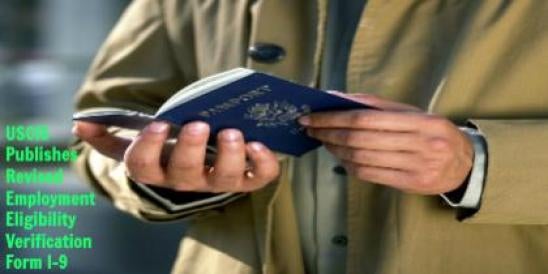The highly anticipated draft Policy Memorandum (L-1B Memo) addressing the qualifying criteria for the L-1B visa category was released by U.S. Citizenship and Immigration Services (USCIS) on March 24, 2015. The L-1B Memo attempts to give immigration practitioners and employers clear guidance on the definition of “specialized knowledge” and the standard of review USCIS adjudicators should apply when evaluating L-1B petitions. The feedback period for the L-1B Memo will end on May 8, 2015 and it will become effective on August 31, 2015. Employers should be prepared to address the qualifying criteria outlined in the L-1B Memo, which clarifies and expands on previous agency guidance regarding L-1B visa adjudication.
Background
The L-1 visa, also known as the intracompany transferee visa, is a nonimmigrant visa classification that allows companies to transfer employees from a related foreign entity to a U.S. company. This visa category has two formats: the L-1A visa for transfer of Executive and Managerial personnel and the L-1B visa for transfer of specialized knowledge personnel.
To qualify for an L-1B visa an employee must possess, among other things, “specialized knowledge.” USCIS regulations define specialized knowledge as “special knowledge possessed by an individual of the petitioning organization’s product, service, research, equipment, techniques, management, or other interests and its application in international markets, or an advanced level of knowledge or expertise in the organization’s processes and procedures.” Many of the issues in current L-1B adjudications surround how this definition is applied in practice, and what a USCIS officer will actually consider to be “specialized.”
The burden of proving that an individual has specialized knowledge, and further proving that the individual will use that knowledge in the U.S. role, rests solely on the petitioning company. This is an inherently challenging process as USCIS officers often have little or no knowledge of the company’s operations and what knowledge may be specialized in their particular industry.
Current state of L-1 and challenges
Congress created the L-1 visa program to allow expedited transfer of employees within the same company. Currently, many employers are finding that the L-1B program has become arduous, arbitrary, and unreliable. L-1B filings are under increased scrutiny by USCIS. Specifically, USCIS has issued an increasing number of requests for additional evidence (“RFE”) and denials. According to the National Foundation for America Policy March 2015 brief, in FY 2014 for L-1B petitions there was a 35% denial rate and a 45% RFE rate. As a comparison, in FY 2006 there was a 6% denial rate and a 9% RFE rate.
The National Foundation for America Policy March 2015 brief also found that Indian nationals have a 56% denial rate versus a 13% denial rate for all other non-Indian nationals. In addition, the March 2015 brief noted that L-1B extensions receive more denials than new L-1B petitions. These findings appear to be the result of change in USCIS L-1B adjudication policy that has not been officially implemented. Many Indian nationals have STEM degrees and are employed in the software engineering field, which USCIS appears to be holding to an arbitrarily high specialized knowledge threshold. In addition, because the L-1B standard has changed over time, cases which were easily approvable several years ago when the initial L-1B was filed are experiencing challenges with the L-1B extension.
In practice, employers receive an RFE on a majority of L-1B filings. The RFE is typically 8 pages long and contains a laundry list of items and supporting documents to show that the candidate qualifies for the L-1B visa category. In many instances, the RFEs appear to be more similar to O-1 extraordinary ability standards than specialized knowledge standards. As a result, many companies choose to file L-1B petitions under the Corporate Blanket L (which is done at a U.S. Consulate or Embassy abroad) where possible or avoid L-1Bs altogether and pursue alternative nonimmigrant visas such as H-1B, TNs, O-1s, etc., or choose to transfer the employee to another country.
The L-1B Policy Memorandum provides some clearer guidance for employers using the L-1B visa program that addresses many of the challenges described above
First, the L-1B Memo asserts that, when adjudicating L-1B petitions, USCIS officers must apply a “preponderance of the evidence standard,” by which an employer must show that it is more likely than not that the employee is eligible for the benefit sought. The L-1B Memo expressly rejects higher standards such as “clear and convincing evidence” or “beyond a reasonable doubt” that some USCIS officers apparently apply when reviewing L-1B petitions. In particular, the L-1B Memo states: “Even if the officer has some doubt about a claim, the petitioner will have satisfied the standard of proof if he submits relevant, probative, and credible evidence, considered ‘individually and within the context of the totality of the evidence,’ that leads to the conclusion that the claim is ‘more likely than not’ or ‘probably’ true.”
In addition, the L-1B Memo confirms that L-1B extensions should not as a matter of course be subject to heightened scrutiny by USCIS officers. For L-1B extensions involving the same underlying facts, the L-1B Memo instructs officers to give deference to the prior USCIS determination. Re-examination of a case should only occur if there was a material error related to the initial L-1B approval, there has been a “substantial change in circumstances” since the approval, or there is new material information that adversely impacts the eligibility for the visa classification. This will help reverse the recent trend of USCIS approval rates being lower for L-1B extensions than for initially filed petitions.
The L-1B Memo provides some clarification of the definition of “specialized knowledge.” It establishes that for knowledge to be “special” or “advanced,” there must be a comparison of the beneficiary’s knowledge against that of other workers. To be “special” the knowledge must be “distinct or uncommon” in comparison to that normally found in the employer/industry, whereas to be “advanced” the knowledge must be “greatly developed or further along in progress, complexity and understanding” than generally found within the employer. Factors USCIS will consider in determining whether a beneficiary’s knowledge is specialized include:
-
Whether the beneficiary possesses knowledge not generally found in the industry or the petitioning organization’s U.S. operations.
-
Whether the beneficiary possesses knowledge that is particularly beneficial to the employer’s competitiveness in the marketplace.
-
Whether the beneficiary has been employed abroad in a capacity involving assignments that have significantly enhanced the employer’s productivity, competitiveness, image, or financial position.
-
Whether the claimed specialized knowledge normally can be gained only through prior experience with that employer.
-
Whether the beneficiary possesses knowledge of a product or process that cannot be easily transferred or taught to another individual without significant economic cost or inconvenience (because, for example, such knowledge may require substantial training, work experience, or education).
-
Whether the beneficiary has knowledge of a process or a product that either is sophisticated or complex, or of a highly technical nature, although not necessarily unique to the firm.
The L-1B Memo also confirms that knowledge need not be proprietary or unique to the petitioning employer, or narrowly held within the petitioning employer to be “specialized,” but such evidence would support a finding that the knowledge is specialized. Moreover, the L-1B Memo reminds USCIS officers that petitioners need not prove that U.S. workers are unavailable to perform the duties of the position. While it may be the case that a high number of U.S. workers possessing knowledge similar to beneficiary’s can result in a conclusion that the beneficiary’s knowledge is not “specialized,” an employer is not required to prove the alternative that knowledgeable U.S. workers are unavailable to establish eligibility for L-1B classification.
The L-1B Memo makes clear that merely stating that a beneficiary’s knowledge is different, special, or greatly developed is not sufficient to qualify for L-1B classification; the employer must submit proof. To that end, the L-1B Memo provides instructions to employers as to the kinds of evidence that can be submitted to USCIS to demonstrate that an individual’s knowledge is “special” or “advanced.” This evidence includes, but is not limited to:
-
A detailed description of the services to be performed;
-
Proof of the beneficiary’s prior education, training, and employment;
-
A comparison of the beneficiary’s knowledge to that of others;
-
Proof of how and when the beneficiary gained the required “specialized knowledge”;
-
An explanation of the difficulty of imparting the beneficiary’s specialized knowledge to others without significant cost or disruption to the employer’s business;
-
Documentation of training, work experience, or education establishing the number of years the individual has been utilizing or developing the claimed specialized knowledge as an employee of the organization or in the industry;
-
Evidence of the impact, if any, the transfer of the individual would have on the organization’s U.S. operations;
-
Evidence that the alien is qualified to contribute to the U.S. operation’s knowledge of foreign operating conditions as a result of knowledge not generally found in the industry or the petitioning organization’s U.S. operations;
-
Contracts, statements of work, or other documentation that shows that the beneficiary possesses knowledge that is particularly beneficial to the organization’s competitiveness in the marketplace;
-
Evidence, such as correspondence or reports, establishing that the beneficiary has been employed abroad in a capacity involving assignments that have significantly enhanced the organization’s productivity, competitiveness, image, or financial position;
-
Personnel or in-house training records that establish that the beneficiary’s claimed specialized knowledge normally can be gained only through prior experience or training with that employer;
-
Curricula and training manuals for internal training courses, financial documents, or other evidence that may demonstrate that the beneficiary possesses knowledge of a product or process that cannot be transferred or taught to another individual without significant economic cost or inconvenience;
-
Evidence of patents, trademarks, licenses, or contracts awarded to the organization based on the beneficiary’s work, or similar evidence that the beneficiary has knowledge of a process or a product that either is sophisticated or complex, or of a highly technical nature, although not necessarily proprietary or unique to the petitioning organization; and
-
Payroll documents, federal or state wage statements, resumes, organizational charts, or similar evidence documenting the positions held and the wages paid to the beneficiary and parallel employees in the organization.
Finally, the L-1B Memo also addresses offsite L-1 employment, where an employee works at non-employer worksite. It re-affirms the two prong test stated in the L-1 Visa Reform Act: (1) the beneficiary is not “controlled and supervised principally by the unaffiliated employer,” and (2) the beneficiary is “placed in connection with the provision of a product or service for which specialized knowledge specific to the petitioning employer is necessary.” Employers should be sure to address these two prongs for any offsite L-1s petitions. Employers should also be aware of and avoid any co-employment challenges, such as where the non-affiliated employer provides guidance and direction to the L-1, provide an email address to the L-1, invites the L-1 to company parties, etc., particularly during a year when 30,000 unannounced H-1B and L-1 employer site visits by USCIS officers are expected.




 i
i


